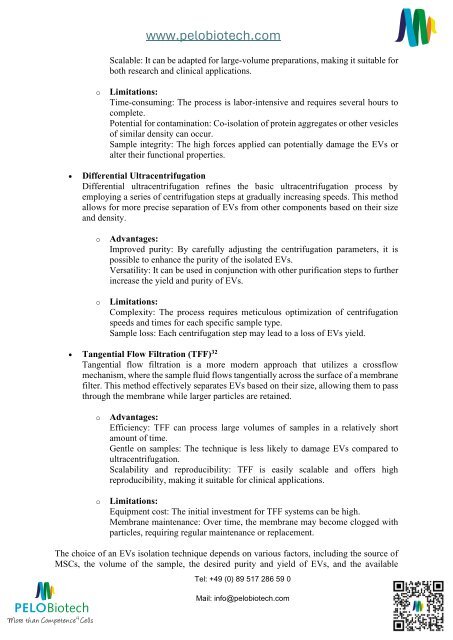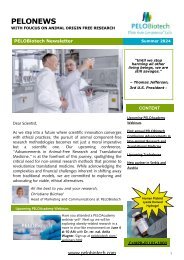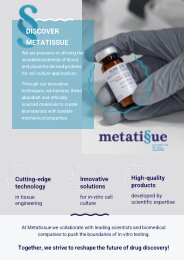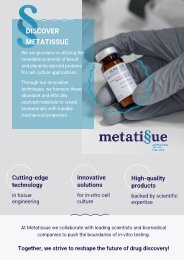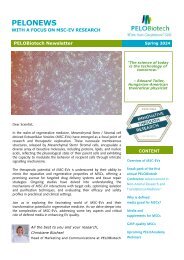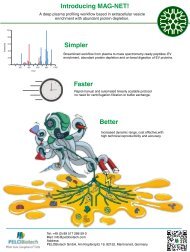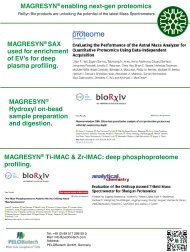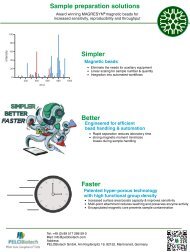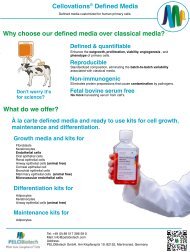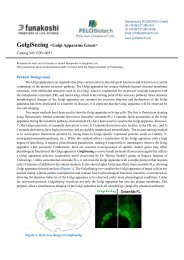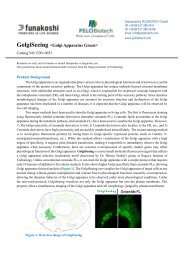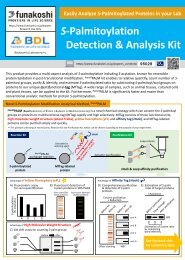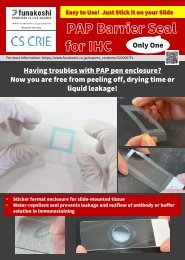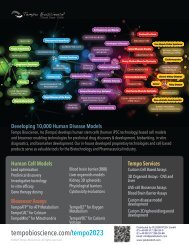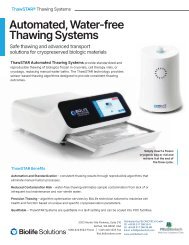Review: MSCs and Exosomes Production
Create successful ePaper yourself
Turn your PDF publications into a flip-book with our unique Google optimized e-Paper software.
www.pelobiotech.com<br />
Scalable: It can be adapted for large-volume preparations, making it suitable for<br />
both research <strong>and</strong> clinical applications.<br />
o<br />
Limitations:<br />
Time-consuming: The process is labor-intensive <strong>and</strong> requires several hours to<br />
complete.<br />
Potential for contamination: Co-isolation of protein aggregates or other vesicles<br />
of similar density can occur.<br />
Sample integrity: The high forces applied can potentially damage the EVs or<br />
alter their functional properties.<br />
• Differential Ultracentrifugation<br />
Differential ultracentrifugation refines the basic ultracentrifugation process by<br />
employing a series of centrifugation steps at gradually increasing speeds. This method<br />
allows for more precise separation of EVs from other components based on their size<br />
<strong>and</strong> density.<br />
o<br />
o<br />
Advantages:<br />
Improved purity: By carefully adjusting the centrifugation parameters, it is<br />
possible to enhance the purity of the isolated EVs.<br />
Versatility: It can be used in conjunction with other purification steps to further<br />
increase the yield <strong>and</strong> purity of EVs.<br />
Limitations:<br />
Complexity: The process requires meticulous optimization of centrifugation<br />
speeds <strong>and</strong> times for each specific sample type.<br />
Sample loss: Each centrifugation step may lead to a loss of EVs yield.<br />
• Tangential Flow Filtration (TFF) 32<br />
Tangential flow filtration is a more modern approach that utilizes a crossflow<br />
mechanism, where the sample fluid flows tangentially across the surface of a membrane<br />
filter. This method effectively separates EVs based on their size, allowing them to pass<br />
through the membrane while larger particles are retained.<br />
o<br />
o<br />
Advantages:<br />
Efficiency: TFF can process large volumes of samples in a relatively short<br />
amount of time.<br />
Gentle on samples: The technique is less likely to damage EVs compared to<br />
ultracentrifugation.<br />
Scalability <strong>and</strong> reproducibility: TFF is easily scalable <strong>and</strong> offers high<br />
reproducibility, making it suitable for clinical applications.<br />
Limitations:<br />
Equipment cost: The initial investment for TFF systems can be high.<br />
Membrane maintenance: Over time, the membrane may become clogged with<br />
particles, requiring regular maintenance or replacement.<br />
The choice of an EVs isolation technique depends on various factors, including the source of<br />
<strong>MSCs</strong>, the volume of the sample, the desired purity <strong>and</strong> yield of EVs, <strong>and</strong> the available<br />
Tel: +49 (0) 89 517 286 59 0<br />
Mail: info@pelobiotech.com


